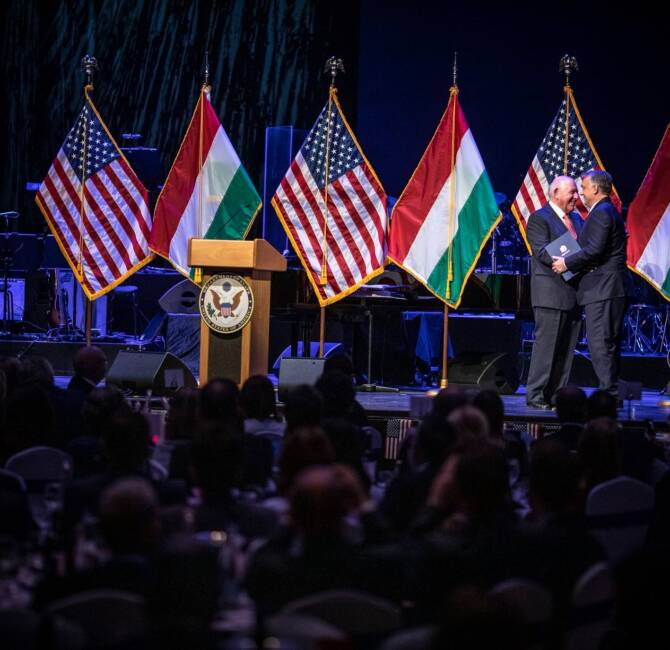This article was published online by the Magyar Nemzet on 17 January 2022.
“Our expectation for the Bosnian Serbs is to return to the work of the government, parliament, and the presidency. It is not in the interest of Bosnia and Herzegovina, nor the Republika Srpska, to separate or prevent institutions from working. I clearly told all of this to Mr. Milorad Dodik as well,” said Olivér Várhelyi in his interview with Magyar Nemzet on the political instability in Bosnia and the personal attacks. In addition to the results of last year’s enlargement and neighborhood policy, we asked the Hungarian member of the European Commission whether the Hungarian elections are a topic of discussion.
2021 was a busy year for the enlargement and neighborhood policy. What do you expect from the coming year? Do you feel anything was missed last year?
The past year really has been quite busy; in terms of enlargement policy and the Western Balkans, a lot of progress was made at the end of 2021. The Slovenian EU presidency held a summit on the Western Balkans in October; here the EU members strengthened the region’s perspective. In addition, enlargement negotiations also took a step forward: we held a government meeting with Montenegro and we were able to start meaningful negotiations with Serbia. In December, the Member States accepted a political statement on enlargement; the document essentially outlines the goals for Western Balkan enlargement in 2022. I consider the biggest success that we are no longer just talking about the economic and social integration of the region, but that we have managed to speed up the process to the point of making it a reality. The milestones I’d like to mention is the start of the Belgrade-Nis railway, as well as the “peace highway” project connecting Serbia, Kosovo, and Albania. The implementation of Von der Leyen’s European Commission’s enlargement policy has therefore begun. I am hoping that in 2022, instead of just political direction, we will begin determining the actual realization of the project. Of course, my disappointment in the fact that North Macedonian and Albanian negotiations have been delayed is obvious. Here, a political problem is the obstacle. In the meantime, there have been new governments in Bulgaria and North Macedonia so I hope in the next half year we can jump this hurdle. I will emphasize that the European Commission will do its utmost to find a pragmatic and politically viable solution for Bulgaria, North Macedonia, and the European Union as a whole.
Then it seems that the plans for negotiations to start earlier with Albania, separately from North Macedonia have been shelved?
Both countries have fulfilled conditions to launch negotiations. So, there is no question – these talks must begin with Albania and North Macedonia. It’s no secret that most EU countries believe we must handle these countries together.
I think that, though it is difficult for Albania, we are counting on a speedy settlement on the dispute between North Macedonia and Bulgaria.
As I said, we will do everything we can to progress and start negotiations as soon as possible.
What results would you highlight in regard to neighborhood policy?
I am pleased that last December we launched a successful Eastern partnership summit. The European Commission also made a policy proposal to renew relations in the region, and we’ve also presented a related investment plan. The latter can also be seen as a tool to help recovery after the pandemic. We see strong commitment on the part of the Eastern partners towards our proposals. We need a healthy investment environment so that the economies of the countries in question can be integrated into Europe as efficiently as possible. A condition for this of course is the resolution of rule of law issues and that European companies can plan in the region for the medium and long term.
As far as the southern states are concerned, we also have on the table plans to stimulate economic cooperation. Another important issue with them is cooperation in the field of illegal migration. Thus, our economic and social offer also means that we expect to be able to work together on illegal migration. We provide the region with significant support, but in return we expect results. All in all, therefore, I am optimistic about enlargement and neighborhood policy and I hope that our results will speak for themselves again this year.
Not everyone is as optimistic, citing the skepticism of the current French EU-presidency. In the meantime, German Chancellor Angela Merkel – one of the most ardent spokespersons of the Western Balkan geostrategy – is no longer in power.
I don’t believe in these assumptions, I think they’re just stereotypes. The French standpoint has changed a lot in the recent past; the French president himself spoke prominently about the Western Balkans when announcing the program of the EU presidency. I think it also has to do with the fact that our committee has come up with a new enlargement methodology and we have also presented a major economic development program. In a way, we have legitimized enlargement policy in the eyes of the French. I see a markedly interested France, proven by the coming French presidency for the Western Balkans congress. As for the new German government, it is reassuring that they have made it clear in their program that they will continue to prioritize Balkan enlargement. We will have to see though what this means in practice. I personally believe that Berlin will continue to support enlargement. In my view, it is in Germany’s interest that there be no change in attitude in this regard.
Bosnia and Herzegovina: fake news about the commissioner
– Bosznia-Hercegovinában a boszniai szerbek még tavaly december elején szavazták meg a szövetségi intézmények egyes jogköreinek átvételét, múlt vasárnap pedig az okozott nagy felzúdulást, hogy megtartották a nemzeti napjukat, ami az ország többi entitását a háború borzalmaira emlékezteti. Mennyire látja aggasztónak a jelenlegi instabilitást?
In Bosnia and Herzegovina, Bosnian Serbs voted to take over some powers from federal institutions back in early December last year; last Sunday, a celebration of their national holiday marking the horrors of war for the country’s other nationalities, caused quite an uproar. How concerning do you find the current instability?
Bosnia and Herzegovina is indeed in a difficult situation. I find the problem especially in the fact that this critical period has nothing to do with external factors. The country’s state of disrepair is due to domestic political issues and motivations. This is a security problem not just for the Western Balkans, but all of Europe. Therefore everyone, the leaders of all three organizations, should be working towards unifying the country in progress and improving domestic cohesion. I would like to call attention, for the umpteenth time, to the fact that everyone guarantees the functioning of the Bosnian government and its institutions. The EU economic and investment plan and the integration process presents Bosnia and Herzegovina with a unique, possible, and potentially one-time opportunity. If the rest of the countries in the region take advantage of this opportunity, and Bosnia falls behind, this could have detrimental effects. In regard to the nationalist celebrations, I don’t think they are helping the situation. Aside from this there are also such issues in the federation which are not specific to the Republika Srpska but should finally be resolved.
Is there any truth to the reports of talks between you and Bosnian Serb leader Milorad Dodik last year? According to the articles in question, you supported the Serbs’ secession from federal institutions.
Every article about this is fake news.
My position on this is clear and consistent, as I said before. When I arrived in Bosnia and Herzegovina last November, I started with a statement and ended my trip with that same statement. Moreover, the European Union’s delegation in the country expressed the same position.
Our expectation towards the Bosnian Serbs is for them to return to the work of the government, parliament, and the presidency. It is not in the interests of Bosnia and Herzegovina, nor the Bosnian Republika Srpska to separate or prevent the work of the institutions. I communicated all of this clearly to President Milorad Dodik.
What about the recent report from the European Court of Auditors that EU funding has so far had little impact on the rule of law reforms in the Western Balkans?
This report did not surprise me, I had come to the same conclusion earlier. I will emphasize that this is the exact reason the new enlargement strategy launched by the European Commission in 2019 was necessary. The rule of law issue plays a central role. All progress in EU enlargement depends on this.
While we are examining how a given country performs in each sector, it is also a condition to make progress on rule of law reforms.
The two aspects go hand in hand. Take the example of Serbia: the opening of new chapters was made possible not only by sectoral progress and plans to properly transpose the EU legislation, but also by the Serbian government’s judicial and electoral reforms. Previously, there was no progress with this for years. Now that this has changed, and the EU Members clearly see the results, the Serbians got the green light.
Hungarian elections a topic of conversation in the Commission
Some Brussels newspapers wonder why the Hungarian EU Commissioner is talking about the rule of law in the Western Balkans. Does this bother you?
This issue cannot be considered on the basis of nationality. I would say that these opinions are not of a European mind. I am assigned my tasks and I complete them to the best of my abilities. Regardless of which country’s citizen I am. My mandate is clear, and we are working along clear criteria in the Eastern, Southern, and Western Balkans. It is not up to me personally, nor my nationality, whether they succeed. It is my job to motivate them and for all three regions to understand the advantages of cooperation.
Is the upcoming Hungarian election a topic of discussion among the Commission’s administration?
As I mentioned, I am sufficiently busy with the tasks that come with my portfolio, yet I find that in the conversations amongst each other, many are interested. There are questions about the main players, the chances and so on. There are no “who’s rooting for who” types of questions, however. At the same time, it is clear that the Hungarian elections will be a defining political event for Europe. Everyone is watching Hungary.
Judi Tamara




